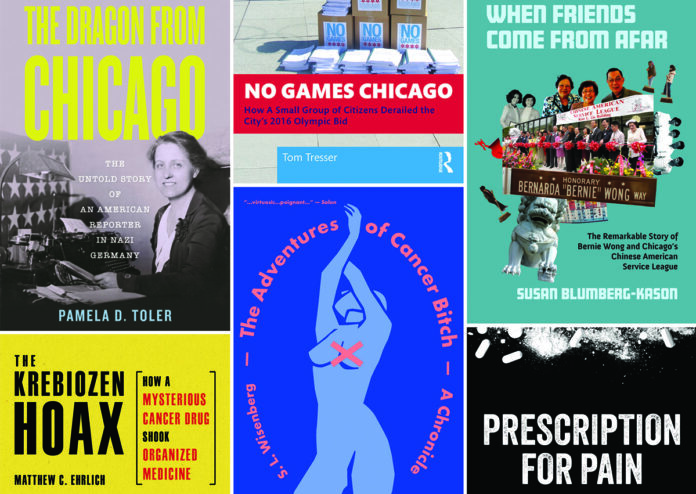’Tis the season when my TBR list is as out of control as ever, but the number of books I can feasibly finish before the end of December is finite. So, I decided to prioritize a small stack of nonfiction books written by or about Illinoisans and published in 2024. For local history buffs and nonfiction fans of many stripes, I offer up a smorgasbord of end-of-year reads: two accounts of Chicago activists, a medical true-crime story, a pharmaceutical hoax, a breast cancer memoir, and the biography of a fierce woman journalist.
When Friends Come From Afar: The Remarkable Story of Bernie Wong and Chicago’s Chinese American Service League by Susan Blumberg-Kason (University of Illinois Press)
If your New Year’s resolutions include giving back to your community, I suggest looking for inspiration in the story of Bernie Wong and the Chinese American Service League, a nonprofit organization she founded with nine friends in the late 1970s. This group of young social workers and graduate students, most of whom immigrated from Hong Kong and met at the University of Chicago, observed specific needs among the immigrants living in Chicago’s Chinatown and pitched in to help. Their grassroots efforts have since blossomed into the midwest’s largest social service agency serving Asian Americans, with programs for children, youth, and seniors; culinary training; affordable housing; mental health care; legal services, and more. Susan Blumberg-Kason’s book is not only a touching tribute to Wong, who died in 2021, but also a testament to the positive impacts of community service.
The Krebiozen Hoax: How a Mysterious Cancer Drug Shook Organized Medicine by Matthew C. Ehrlich (University of Illinois Press)
In light of the medical misinformation and public health conflicts that have marked the first half of this decade, it’s illuminating to look back at a period in the 1950s and ’60s when a purported miracle treatment for cancer sparked a swirl of conspiracy theories, public protests, government hearings, and legal cases. Much of the furor centered on the University of Illinois Urbana-Champaign, where revered physiologist and university vice president Andrew Ivy championed the cause of Krebiozen, a drug peddled by Yugoslavian doctor Stevan Durovic and embraced by a range of cancer patients, politicians, and journalists. Matthew C. Ehrlich, professor emeritus of journalism at U. of I., deftly traces the dramatic twists and turns of what he calls a “quintessential example of quackery.”
Prescription for Pain: How a Once-Promising Doctor Became the “Pill Mill Killer” by Philip Eil (Steerforth)
This book came onto my radar at the 2024 American Writers Festival, where author Philip Eil participated in a true-crime panel. It tells the story of Paul Volkman, a physician who trained at the University of Chicago and lived in the city throughout his adult life, until he received four consecutive life sentences in federal prison for his “pill mill” operation in southern Ohio. Much of the deeply researched book follows Volkman’s career, but Eil also devotes significant attention to the 13 people whose overdose deaths were linked to the doctor’s criminally unscrupulous methods (this number is likely an undercount). The result is not only an intriguing true-crime story but also a moving look at a community that has suffered greatly during the opioid epidemic.
The Dragon From Chicago: The Untold Story of an American Reporter in Nazi Germany by Pamela D. Toler (Beacon Press)
It’s hard to think of a higher compliment for a journalist in Nazi Germany than to be nicknamed “that dragon from Chicago” by Hitler’s second-in-command, Hermann Göring. This badass moniker refers to the subject of a new biography: Sigrid Schultz, the trailblazing woman who led the Chicago Tribune’s Berlin bureau during the Nazis’ rise to power and the early years of World War II. Spending her early childhood on Chicago’s north side and an itinerant adolescence in Europe, Schultz was seemingly born for this role, with her talent for languages, keen interest in politics and history, dogged work ethic, and savvy networking skills. Historian Pamela D. Toler frames her remarkable career within the broader history of American journalism, tracing the field’s gender dynamics, the expansion of international news coverage, the birth of radio newscasts, and the risks of reporting from countries with strict censorship laws.
No Games Chicago: How a Small Group of Citizens Derailed the City’s 2016 Olympic Bid by Tom Tresser (Routledge)
You don’t hear much these days about Chicago’s failed bid to host the 2016 Summer Olympics. As a lifelong Illinoisan, I was only vaguely aware of this consequential chapter in our recent history until I read a firsthand account by Tom Tresser, one of the leaders of No Games Chicago, a grassroots group that successfully opposed the bid in 2009. Among the activists’ many concerns were the Olympics’ history of ballooning costs, privatization of public land, and restrictions of civil liberties. Many of their warnings turned out to be justified: the 2016 host city, Rio de Janeiro, ultimately spent an estimated $23.6 billion on the Games, overrunning its budget by 352 percent. “I was a major participant in this story, and I have waited for years for someone to tell it. No one has stepped forward, so I decided to give an account,” writes Tresser, a civic educator and public defender.
The Adventures of Cancer Bitch by S.L. Wisenberg (Tortoise Books)
Local author, editor, and writing coach S.L. Wisenberg survived breast cancer 17 years ago and wrote a memoir about the experience in her trademark style—a blend of wry, self-deprecating humor and sharp social commentary. Along with frank observations about the painful process and physical indignities of a mastectomy and chemotherapy, she analyzes the U.S. health-care system’s shortcomings, the cancer research fundraising complex, and the gendered dynamics of breast reconstruction surgery. She also recounts the farewell party she threw for her left breast and the “U.S. out of Iraq” henna tattoo she sported on her bald head. For the 15th anniversary edition released this year, Wisenberg has revised and expanded her book with a new postscript and endnotes.






